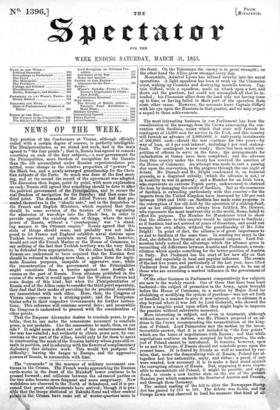NEWS OF THE WEEK.
THE position of the Conferences at Vienna, although officially veiled with a certain degree of reserve, is perfectly intelligible. The Plenipotentiaries, as we stated last week, had in the main agreed to "the four points " • that is, Russia had agreed to coneede something on each of the four subjects,— a new government for the Principalities, more freedom of navigation for the Danube than the silt accumulated under Russian superintendence per- mitted, some change in the relative proportion of "powers" in the Black Sea, and a- newly-arranged guardianship for the Chris- tian inbjeets of the Porte. So much was done at the first meet- ing, and at the second the record of the agreement was adopted. The discussion then began, point by point, with more explanation on each: Russia still agreed that something should be done to alter the political government of the Principalities, and to secure the real freedom of navigation for the Danube; and then came the third point. The demands of the Allied Powers had first pre- sented themselves in the " identic note," and in the despatches of the French and English Ministers, which required that there should be some revision of the treaties of 1841 regulating the admission of war-ships into the Black Sea, in order to provide against the existing state of things, where the naval power of Russia, without a " counterpoise, ' was "a stand- ing menace to the Ottoman empire." Russia agreed that this state of things should cease, and probably was not indis- posed to let France and England establish naval stations upon Turkish territory, and maintain naval forces. That, however, would not suit the French Marine or the House of Commons, to : say nothing of the fact that Turkish territory was the very thing to be defended from appropriation. On the other hand, the Allied Powers are understood to have required that the Russian fleet should be reduced to nothing more than a police force for legiti- mate Russian purposes, incapable of aggressive uses ; while the reconstruction of the government of the Principalities might constitute them a barrier against new hostile ad- vances on the part of Russia. From allusions published in the course of the week it would appear that the Western Powers had some design of this kind ; but when the Plenipotentiaries of Russia and ofthe Allies come to consider the third point separately,
they. find that ,their modes of providing for its practical executionare inconsistent with each other. Here, then, the Congress at
Vienna stops—comes to a sticking-point; and the Plenipoten- tiaries refer to their respective Governments for further instruc- tions. This reference will °onetime several days; and meanwhile the Congress is understood to proceed with the consideration of other points.
That the Emperor Alexander desires to conclude peace, is pro- bable; that he can make the concessions necessary to conclude peace, is not probable. Can the concessions be made, then, on our side ? It might seem a short cut out of the embarrassment that the war has entailed; but evidently to obtain peace now, by con- eessions on the part of the Allies, would only be for them to assist in constructing the mask of the Russian battery whose guns still re- main in position, and in adorning with the flowers of complimentary diplomacy that delusive work. This would but postpone the difficulty; leaving the danger to Europe, and the aggressive powers of Russia, to accumulate with time.


























